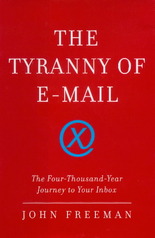Book review: John Freeman, “The tyranny of e-mail” – The Four-Thousand-Year Journey to your Inbox
 I ‘ve read once a story about a Japanese man who got married to the virtual girlfriend he dated in a Nintendo DS video game called Love Plus– a wedding blessed by a priest and not a virtual one. This is no doubt an eccentric way to declare one’s devotion to a machine. But as John Freeman, an award – winning writer and editor of Granta, points out in his book The Tyranny of e-mail, most of the “normal” users of internet are married to their computers, since they spend more time with them than with their beloved ones.
I ‘ve read once a story about a Japanese man who got married to the virtual girlfriend he dated in a Nintendo DS video game called Love Plus– a wedding blessed by a priest and not a virtual one. This is no doubt an eccentric way to declare one’s devotion to a machine. But as John Freeman, an award – winning writer and editor of Granta, points out in his book The Tyranny of e-mail, most of the “normal” users of internet are married to their computers, since they spend more time with them than with their beloved ones.
Freeman, through a historical and social analysis upon the nature of correspondence, intends to illumine the causes and effects of information overload that reached its peak with the explosion of internet and especially with the apotheosis of e-mail. An invention which turned into obsession, “forcing” millions of users to shoot back and forth messages 24/7, no matter what, no matter when. Instead of deliberating us and saving us time, e-mail “has made us a workforce of reactors, racing to keep up with a treadmill pace that is bound for burnout and breakdown and profound anger”.
The speed of sending and receiving messages, along with the easiness of forward and the ability to create new identities are gradually transforming us into “Borg” (remember Star Wars?): a constantly connected life – form. Never before has man been so tightly embraced to machines than in the digital now. A fact that changed radically both our work and social life. In the name of productivity, we are willing to sacrifice our privacy, the fun of face-to face interaction, our critical thought.
But isn’t there a bright side? I couldn’t help thinking that Freeman in his effort to alarm us to step away from our inbox, he diminishes the “usefulness” of e-mail. I strongly believe that somewhere inside your inbox labyrinth there are answers to questions, notifications on interesting events or just a few lines that will make us smile.
Thank God, Freeman goes further than just exposing the evil side of e-mail. He comes up with the slow communication movement, as an antidote to our e-mailing mania which is “encroaching on parts of our lives that should be separate or sacred, altering our minds and our ability to know our world, encouraging a further distancing from our bodies and our natures”. And everything starts with a simple recommendation: “Don’t send”.
The truth is that I could see myself in this book. Even while writing this review, I couldn’t resist checking my mailbox every now and then, chatting with friends on Facebook, sending messages loaded with emoticons to Skype. I myself am a victim of the tyranny of email, doomed to love this disembodied, impersonal, emotionally exhausting form of communication.
In the last chapter of the book, John Freeman gives us some tips (e.g. don’t send e-mails, check your inbox twice a day, give good e-mail e.t.c.) that sound practical and sensible. But the question is: are they doable? Or in other words, will technology wait for us? Speaking from personal experience, if I had been checking more often my inbox, I wouldn’t have missed the deadline for the picnic contest. And as far as the “don’t send” recommendation is concerned, do I really have the option not to send this review before the deadline goes dead?
“The tyranny of e-mail” was published in 2009 by Scribner.